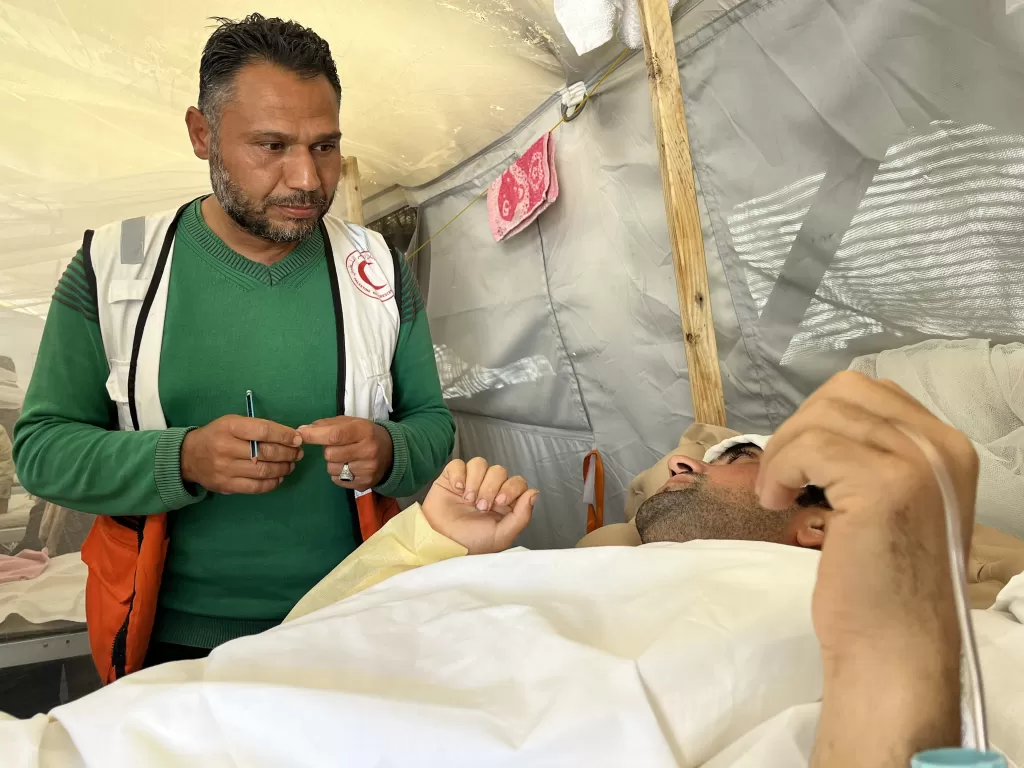
Following the ceasefire agreement, DEC charities and their local partners are scaling their work up again after months of extraordinary challenges delivering aid. The levels of need in Gaza remain catastrophic.
What happens next?
Under the new agreement, access for desperately needed humanitarian aid is beginning to increase. DEC charities and their local partners are starting to adapt their programmes to resume lifesaving activities at scale, including urgently needed food and water distributions. Trucks of food, medicine and essential supplies have started to enter Gaza, and more are expected to cross in the coming days.
During the temporary ceasefire earlier this year, they were able to replenish supplies, deliver hot meals, and repair damaged water systems. Despite the many challenges, the work carried out during that time shows what they are able to deliver when they are in a position to provide aid at scale. As people look towards an uncertain future, your support can be a lifeline.
What is happening in Gaza?
In August famine was confirmed in Gaza for the first time. The UN-backed global hunger monitor, the IPC, said that famine is now a reality across Gaza City and the surrounding areas, where hundreds of thousands of people were also displaced in recent weeks as the conflict escalated.
Since the ceasefire agreement, many have returned to Gaza City to find their homes destroyed. They are living in makeshift shelters without access to essential supplies and services. The UN estimates that over 80% of buildings in Gaza have been destroyed. As winter approaches, the need for warm shelter and clothing is urgent.
Although in some areas goods are starting to return to local markets and prices are becoming more affordable, they are still out of reach for many families without humanitarian support.
Since the last ceasefire, the health system across Gaza has been decimated, and a dire shortage of fuel has meant the few hospitals still operating have been forced to make impossible decisions about the treatment they can provide.
Through everything, staff and their families are still dealing with unimaginably harsh conditions as they carry out their vital work.
How are DEC charities supporting people?
Under the new ceasefire agreement, DEC charities are beginning to adapt and expand their programmes, as access for desperately needed humanitarian aid starts to increase. They are scaling up food, water, medicine and cash distributions, and supporting people as they return to their communities in the north. The challenges are immense, and sustained access for food and nutrition support is essential to address the famine and save lives.
It will take years to rebuild Gaza, but DEC charities and their local partners urgently need more funds to begin restoring damaged water systems, and to reopen health facilities.
Throughout the crisis, they have constantly adapted programmes to deal with extremely limited access for humanitarian aid. Despite the devastating impact this has had, they have found ways to continue providing whatever food, water, medicine and supplies they can. You can find out more about their response over the past year here.
Donations to the Middle East Humanitarian appeal have, and continue to, play a key part in supporting their work.

Staff and volunteers from the Palestine Red Crescent Society and British Red Cross have been helping the many sick and injured at the ICRC field hospital in Rafah, supported with DEC funds. Image: ICRC/British Red Cross
Examples of how DEC charities and their local partners are supporting people in Gaza since the ceasefire agreement include:
- CAFOD is scaling up work through their local partner Caritas Jerusalem. DEC funds are helping them to deliver cash, psychosocial support and medical care.
- The International Rescue Committee is scaling up its programmes providing vital cash support thanks to DEC funds.
- Several of Plan International’s trucks have now entered Gaza with food and other essential supplies.
- The British Red Cross and its partners, including the Palestine Red Crescent Society, are scaling up providing urgently needed medical care and other essential support. Trucks of Red Cross and Red Crescent supplies have entered Gaza since the ceasefire agreement.
How you can help
Donations to the DEC Middle East Humanitarian Appeal are making a difference. The appeal is open for donations and more funds will help DEC charities and their local partners scale up their response. Please donate now.